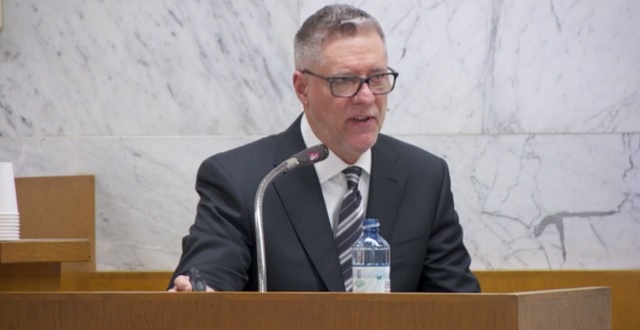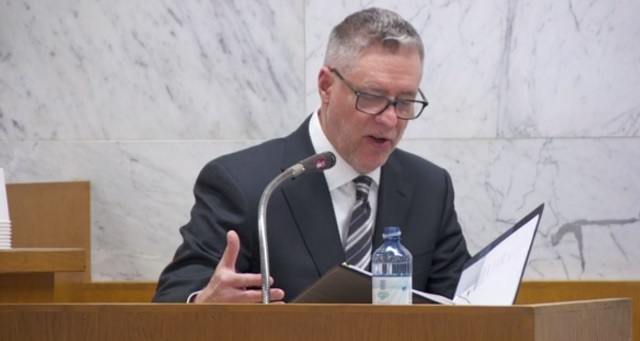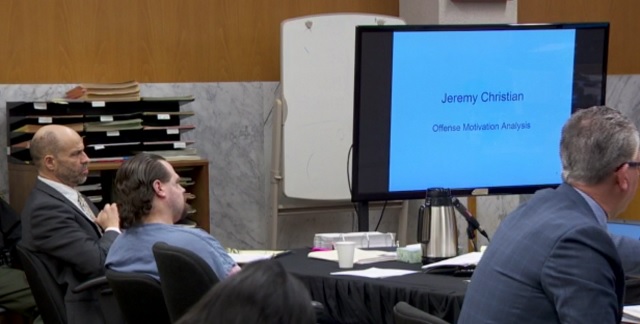PORTLAND, Ore. (KOIN) — Once again the jury has the case of Jeremy Christian, only this time it’s to determine how he could be sentenced.

After 2 days of listening to more testimony related to “enhanced factors” that could be considered for sentencing, the jury was tasked with deciding details that Judge Cheryl Albrecht could use to hand down her decision.
Prosecutors laid out their case that the 37-year-old convicted killer “absolutely” could hurt someone again. The defense said “he’s not going to be the same person” when he’s 40 or 50 or 60.
The jury unanimously convicted Christian on all 12 charges he faced — including first-degree murder.
The jury does not have a timeline for deliberations on the six enhancement factors. They will continue deliberations on Thursday.
No official sentencing date has been set, but both sides are looking to late March. Christian faces a maximum of life in prison without parole. In late October 2019, prosecutors filed a motion that took the death penalty off the table
The jury will not make a recommendation on sentencing. Judge Albrecht will impose the prison sentence for Jeremy Christian.
Defense makes their sentencing factors case
The defense made a motion to dismiss the enhancement factors in a point-by-point rebuttal:
- Factor 1: “That there is a high probability that the defendant cannot be rehabilitated.” The defense doesn’t think the jury was given enough evidence regarding Christian’s prospects for rehabilitation.
- Factor 2: “That the defendant’s crimes were precipitated by his unreasonable racial and religious bias.” Defense attorneys say the question enhancement factor can’t be applied to the first four counts (murder, attempted murder, and assault) because the victims appear to be Caucasian.
- Factor 3: “That the defendant demonstrated no remorse for his acts.” Defense attorneys say the State’s use of the word “no” is problematic because at least two witnesses said Christian said he was sorry to find out he had killed Ricky Best.
- Factor 4: “That the defendant’s acts demonstrated his callous disregard for the value of human life.” The defense team says the term was not defined for the jury and, really, could only be applied to the murder counts.
- Factor 5: “That the defendant is likely to commit future acts of violence.” Defense attorney Greg Scholl says there has not been any evidence presented about that at all and said they don’t have a divining rod or crystal ball.
The judge denied the motion but agreed there is a lack of definitions and that some of the questions are vague.
“I think at some point the court is free to disregard these and apply the factors the court thinks are appropriate,” Judge Cheryl Albrecht said.
Psychologist testifies

Psychologist Mark Douglas Cunningham testified for the defense. He met with Christian numerous times, as recently as last spring and also met with his parents and some acquaintances. Cunningham is presenting his evaluations of Christian which include:
Cunningham’s evaluation of Jeremy Christian include:
- Unable to meet expected adult roles for autonomy, relationships, etc.
- Rationalizes his failure to establish a functional adulthood with idiosyncratic political beliefs (e.g. he never gets a driver’s license and justifies it by saying cars are bad for the environment)
- Longstanding, obsessive focus on comic books
- Social impairments also take the form of improbable/conspiratorial beliefs
- Relates to others as a provocateur in the face of his lack of social fluency
- Provocative behaviors become more pronounced when under the influence of alcohol
- Described being in his provocateur role on the MAX preceding the May 26, 2017 attack.
Prosecutors cut him off shortly after that 7th finding, arguing these are irrelevant in relation to the questions the jury is being asked to consider.
Judge Albrecht overruled the objection, saying she thinks a thorough examination of Christian’s mind now is appropriate.
Cunningham earlier refuted the prosecution’s claims that Christian is a white supremacist.
Based on his evaluations, Christian is “not subtle about what he thinks” and “compulsively” has to tell people what he believes. If Christian holds racist beliefs, you’re not going to have to search for some clue in social media, Cunningham said. “He can’t help himself but to tell you all about what he thinks.”
That directly addresses the second enhancement factor the jury is being asked to decide on.
Jury unanimous: Jeremy Christian guilty on all charges
Cunningham continued with his evaluation:
- In the escalating confrontation that followed, Christian described misperceptions of imminent attack by three or more assailants
- When fearful or angry, exhibits little control over his emotions/behavior and impaired ability to calm himself
- Christian was deteriorating psychologically in the months preceding the offense (e.g. mom preparing to throw out comic books. Also, a friend said two days before the stabbing, they had a verbal fight about his outrageous statements about Christians and Muslims)
- Prison experiences had an exacerbating impact on his social dysfluency (Cunningham spoke at length on the psychological impacts of putting inmates in solitary confinement)
- Exhibits symptoms consistent with mental disorders

Cunningham also dug deep into Christian’s family history and home life, talking with both Christian’s parents and making findings about possible mental disorders as far back as his grandparents on both sides. Cunningham says Christian’s paternal grandfather was overbearing, judgmental and not shy about publicly berating people. He compared this to some of Christian’s behaviors.
Jurors also heard more about Christian’s father Don, who Cunningham says had no relationship with his parents or siblings and had no close friends as an adult, pointing to the same kind of social dysfluency seen in his son. Cunningham said Christian’s mother described a cold marriage in which Don was “indifferent to her feelings,” didn’t learn any parenting skills, and was quick tempered.
Cunningham said all three of Christian’s brothers have problems reading social cues, maintaining relationships, and holding down jobs. However, Cunningham said Christian’s mother only ever described one of her sons as being autistic, even though the psychologist mused that they all show signs of the disorder. According to Cunningham, Tim Christian lit fires in the neighborhood as a preteen, dropped out of high school, was arrested for DUII, and acted violently toward his mother and a girlfriend at times when he was under the influence.
Shifting to Christian’s maternal side of the family, Cunningham said hoarding disorders go back generations. Cunningham said Christian demonstrated some of those same behaviors with his comic book collection, amassing some 15,000 issues in his bedroom in his parent’s home after he was released from prison.
Christian’s mother, who has been present throughout the trial, did not take her usual seat in the gallery Wednesday morning.
Closing arguments in sentencing hearing

At one point in closing, prosecutor Don Rees appeared to scoff at Cunningham’s belief that racism didn’t play any role in Christian’s crimes. Rees looked straight at Christian in court as he told the jury they have already determined Christian was motivated by “racist hatred,” at which point Christian stretched his arms above his head.
A minute later, Rees started to say that in Tuesday’s testimony when they were talking about Christian referring to victim Demetria Hester as a “racist, black bit**,” Christian shook his head and smirked. Judge Albrecht told the jury to disregard Rees’ comment about Christian’s demeanor, citing previous case law.
Toward the end of his closing arguments, Rees asked the jury, “Based on your common sense, is he someone who’s going to hurt someone again? And in the State’s view the answer is absolutely.”
In the defense’s closing arguments, attorney Dean Smith read excerpts of letters from correctional deputies saying Christian has been an even-tempered, obedient inmate since July 2017. One deputy even wrote he was “one of the easiest inmates that I have ever managed on the 4th floor.”
Another deputy wrote Christian has gotten along with everyone, regardless of race, religion etc. “In fact, I have heard other inmates comment on how he isn’t the racist that the news describes him as,” defense attorney Dean Smith read.
Smith asked the jury to look ahead to when Christian is older. “What about when he’s 40 and 50 and 60 and 65? Is he going to be the same person? He’s not going to be the same person. He’s going to grow and he’s going to change.”
The background
On May 26, 2017, Christian killed Taliesin Namkai-Meche and Ricky Best and critically wounded Micah Fletcher in an attack on a MAX Green Line as it pulled into the Hollywood Transit Center.
His trial began January 28, 2020 and he was convicted February 21, 2020.
Complete KOIN Coverage: The MAX Attack Trial